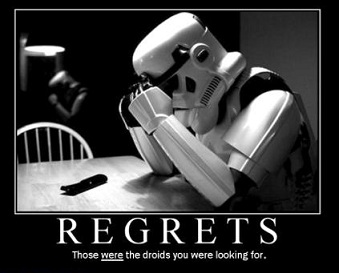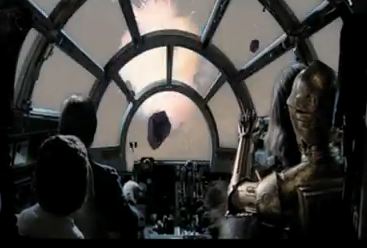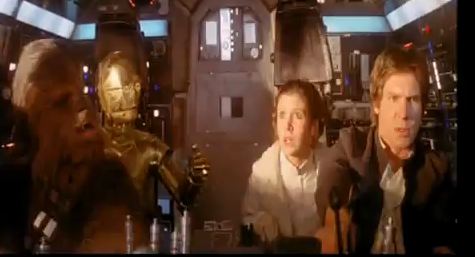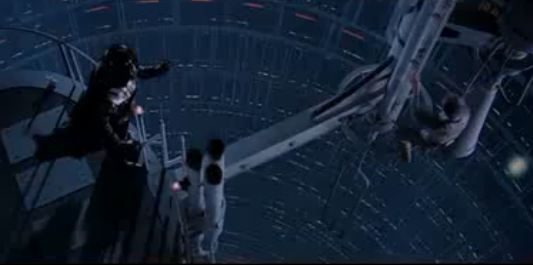October 14, 2010
The Military And PTSD: A Star Wars Guide

In The Empire Strikes Back, the Millennium Falcon is being pursued by Imperial Star Destroyers and several TIE fighters.
Something hits the Falcon. "That's not a laser blast..." says Han.
"Asteroids!" yells Leia from the cockpit. They are everywhere. She quickly gets up to allow Han to take control.
He makes a snap decision. "Chewie, set 271."
She didn't expect him to say that. "What are you doing?.... You're not actually going into an asteroid field, are you?"
"They'd be crazy to follow us, wouldn't they?"
 Han Solo deftly turns and flips the ship, trying to doge the both the asteroids and the laser blasts from the remaining TIE fighters. Leia, Chewie and C3PO stare powerlessly as asteroid after asteroid almost obliterates them.
Han Solo deftly turns and flips the ship, trying to doge the both the asteroids and the laser blasts from the remaining TIE fighters. Leia, Chewie and C3PO stare powerlessly as asteroid after asteroid almost obliterates them.
It becomes obvious to all that this was a terrible idea.

"You said you wanted to be around when I made a mistake," Solo deadpans. "Well, this could be it."
"I take it back....we're going to get pulverized if we stay out here any longer!" Leia says.
"Can't argue with you there. I'm going in closer to one of the big ones."
"Closer?!"

Take a good look at the expressions on their faces. Solo focused, almost angry. Leia terrified. Chewbacca fearful and incredulous.
This is a kind of exposition, the character's personalities being revealed through a trial.
They all come out ok, but let's say they didn't. Excepting the metallic version of Professor Smith, who there is most likely to get PTSD?
Chewbacca is an ex-soldier who has seen all kinds of war horrors. Leia's been tortured, seen her home planet be destroyed, been in gun fights, so it's not like she hasn't been stressed. But looking at their faces, it's evident that they are more terrified, there's something about Solo that lets him manage his fear and his response to it. Genetics? Toughness derived from years of hardships? Alcohol?
It may not be any of these things. It may simply be that Han Solo is driving.
II.
Thanks to a reader, 2LT Timlin for turning me on to Sebastian Junger's War, a book I had never heard of and which apparently no one in the military has either.
Two things to note: one is the perception of powerlessness as a factor in stress; the other is that action is useful for its own sake. Action according to logic or training can be empowering even if it is itself purposeless.
III.
Junger starts his book with this epigraph, from Lord Moran's Anatomy of Courage:
IV.
And note the wording of the last sentence: "allowed them to ignore... reality."
IV.
Marshall McLuhan once said, "if everything around you is a nail, then get a really strong hammer." So the psychodynamic hammer: if narcissism is the exertion of will towards the maintenance of ego-- trying to get everyone to see you the way you want to be seen, and to get them to act the way you need them to act-- then a narcissistic injury would be the discovery of the limitations of your own power.
If the Americanized culture of the past two generations has deliberately encouraged narcissism as a positive personality structure, then we can expect higher rates of PTSD than in WWII not because the physical stresses are more severe-- in fact, they are most often less severe-- but because the discovery of the limitations of our own power shock us more deeply than it shocked them.
Typically, avoidance and flashbacks are the proxies for the diagnosis of PTSD, but these are drawn from experience with soldiers from a different time and a different culture. Today, the primary symptom of a traumatic reaction to the discovery of powerlessness wouldn't be fear but rage. Hence, new onset domestic violence is more sensitive than nightmares. "Being there" (suddenly staring off into the distance) more specific than reliving the traumatic event.
It follows that a PTSD soldier at home would be much less traumatized by a terrible car accident than by the suspicion that his wife is cheating.
IVb.
I'm not saying soldiers are narcissists; but that's the culture we were taught from the day of our birth. The military should have made an effort to understand the psychic vulnerabilities of the culture it was recruiting from, and adjusted its training to anticipate those vulnerabilities.
More broadly, a nation that chooses to go to war-- for good reasons or bad-- should train its population to be more selfless, to establish as obvious that each person is merely part of a far more important whole, and to incentivize displays of that thinking with explicit rewards.
 and you wonder why there are no other Wookies in V and VI
and you wonder why there are no other Wookies in V and VI
If it cannot do this, if it can't institutionalize this, it shouldn't go to war, most practically because it will not win.
V.

I wasn't so young 30 years ago that I shouldn't have known better.
After Vader tells Luke he is his father, he implores Luke to join him, "together we can rule the galaxy!" etc.
I remember thinking, why doesn't Luke just lie? Why doesn't he just pretend to join Vader, and then light saber him in the head or poison his rebreather later on? Instead, he jumps like a Stoic.
Short term yes, long term no. Turns out Lucas/Campbell was right and I was wrong. In extreme scenarios, for example torture or being a prisoner of war, lying and pretending gives short term gain but accelerates your mental breakdown. People who have survived have done so not by toughing it out-- me vs. you-- but focusing on something they considered more important than their own survival. "This hurts, but it's far better than bowing down to them."
In the language of learned helplessness: there is a vicarious learning in watching yourself apparently break down and give them what they want. Furthermore, it reveals the limits of your power: I had no other options but acquiescence.
The military's immediate problem is that this advice must now be learned in adulthood; there hasn't been 20 years of practice. It is not reflexive; narcissism is. I hope it requires no elaboration that the people we are currently fighting have exactly the opposite circumstance.
IV.
Many of the solutions propose themselves, but with respect to the military, and any organization that rises or falls on the tenacity and relentlessness of its members, Lord Moran offers this generally unpalatable perspective:
The answer is no.
---
http://twitter.com/thelastpsych
Something hits the Falcon. "That's not a laser blast..." says Han.
"Asteroids!" yells Leia from the cockpit. They are everywhere. She quickly gets up to allow Han to take control.
He makes a snap decision. "Chewie, set 271."
She didn't expect him to say that. "What are you doing?.... You're not actually going into an asteroid field, are you?"
"They'd be crazy to follow us, wouldn't they?"
 Han Solo deftly turns and flips the ship, trying to doge the both the asteroids and the laser blasts from the remaining TIE fighters. Leia, Chewie and C3PO stare powerlessly as asteroid after asteroid almost obliterates them.
Han Solo deftly turns and flips the ship, trying to doge the both the asteroids and the laser blasts from the remaining TIE fighters. Leia, Chewie and C3PO stare powerlessly as asteroid after asteroid almost obliterates them.It becomes obvious to all that this was a terrible idea.

"You said you wanted to be around when I made a mistake," Solo deadpans. "Well, this could be it."
"I take it back....we're going to get pulverized if we stay out here any longer!" Leia says.
"Can't argue with you there. I'm going in closer to one of the big ones."
"Closer?!"

Take a good look at the expressions on their faces. Solo focused, almost angry. Leia terrified. Chewbacca fearful and incredulous.
This is a kind of exposition, the character's personalities being revealed through a trial.
They all come out ok, but let's say they didn't. Excepting the metallic version of Professor Smith, who there is most likely to get PTSD?
Chewbacca is an ex-soldier who has seen all kinds of war horrors. Leia's been tortured, seen her home planet be destroyed, been in gun fights, so it's not like she hasn't been stressed. But looking at their faces, it's evident that they are more terrified, there's something about Solo that lets him manage his fear and his response to it. Genetics? Toughness derived from years of hardships? Alcohol?
It may not be any of these things. It may simply be that Han Solo is driving.
II.
Thanks to a reader, 2LT Timlin for turning me on to Sebastian Junger's War, a book I had never heard of and which apparently no one in the military has either.
The Navy study compared stress levels of the pilots [who have to land on tiny aircraft carrier landing strips] to that of their radar intercept officers, who sat immediately behind them but had no control over the two-man aircraft. The experiment involved taking [cortisol] samples of both men on no-mission days as well as immediately after carrier landings... Radar intercept officers lived day-to-day with higher levels of stress -- possibly due to the fact that their fate was in someone else's hands -- but on mission days the pilots' stress levels were far higher. The huge responsibility borne by the pilots gave them an ease of mind on their days off that they paid for when actually landing the plane.
The study was duplicated in 1966 with a twelve-man Special Forces team in an isolated camp near the Cambodian border in South Vietnam... There was a serious possibility that the base would be overrun, in which case it was generally accepted that it would be "every man for himself." The two officers saw their cortisol levels climb steadily until the day of the expected attack and then diminish as it failed to materialize. Among the enlisted men, however, the stress levels were exactly the opposite: their cortisol levels dropped as the attack drew near, and then started to rise when it became clear that they weren't going to get hit... "The members of this Special Forces team demonstrated an overwhelming emphasis on self-reliance, often to the point of omnipotence," they wrote. "These subjects were action-oriented individuals who characteristically spent little time in introspection. Their response to any environmental threat was to engage in a furor of activity which rapidly dissipated the developing tension."
Specifically, the men strung C-wire and laid additional mines around the perimeter of the base. It was something they knew how to do and were good at, and the very act of doing it calmed their nerves. In a way that few civilians could understand, they were more at ease facing a known threat than languishing in the tropical heat facing an unknown one.
Two things to note: one is the perception of powerlessness as a factor in stress; the other is that action is useful for its own sake. Action according to logic or training can be empowering even if it is itself purposeless.
III.
Junger starts his book with this epigraph, from Lord Moran's Anatomy of Courage:
The quote is popular all over the internet, but it's a misquote. This version conveys the impression that everyone feels fear, but only a coward acts on it.By cowardice I do not mean fear. Cowardice... is a label we reserve for something a man does. What passes through his mind is his own affair.
By cowardice I do not mean fear. Fear is the response of the instinct of self preservation to danger. It is only morbid, as Aristotle taught, when it is out of proportion to the degree of the danger. In invincible fear-- 'fear stronger than I am'-- the soldier has to struggle with a flood of emotion; he is made that way. But fear even when morbid is not cowardice. That is a label we reserve for something that a man does. What passes through his mind is his own affair.The forces that go into creating cowardice were often outside of the coward's control. He probably didn't want to be a coward; he wasn't trained not to be.
IV.
One of the most puzzling things about fear is that it is only loosely related to the level of danger. During World War II, several airborne units that experienced some of the fiercest fighting of the war also reported some of the lowest psychiatric casualty rates in the U.S. military. Combat units typically suffer one psychiatric casualty for every physical one, and during Israel's Yom Kippur War of 1973, frontline casualty rates were roughly consistent with that ratio. But Israeli logistics units, which were subject to far less danger, suffered three psychiatric cases for every physical one. And even frontline troops showed enormous variation in their rate of psychological breakdown. Because many Israeli officers literally led from the front, they were four times more likely to be killed or wounded than their men were -- and yet they suffered one-fifth the rate of psychological collapse. The primary factor determining breakdown in combat does not appear to be the objective level of danger so much as the feeling -- even the illusion -- of control. Highly trained men in extraordinarily dangerous circumstances are less likely to break down than untrained men in little danger.Note again the relationship of the feeling of control-- not the actual possession of control-- to the reduction of fear.
The division between those who feel in control of their fate and those who don't can occur even within the same close-knit group. During World War II, British and American bomber crews experienced casualty rates as high as 70 percent over the course of their tour; they effectively flew missions until they were killed. On those planes, pilots reported experiencing less fear than their turret gunners, who were crucial to operations but had no direct control over the aircraft. Fighter pilots, who suffered casualty rates almost as high as bomber crews, nevertheless reported extremely low levels of fear. They were both highly trained and entirely in control of their own fate, and that allowed them to ignore the statistical reality that they had only a fifty-fifty chance of surviving their tour.
And note the wording of the last sentence: "allowed them to ignore... reality."
IV.
Marshall McLuhan once said, "if everything around you is a nail, then get a really strong hammer." So the psychodynamic hammer: if narcissism is the exertion of will towards the maintenance of ego-- trying to get everyone to see you the way you want to be seen, and to get them to act the way you need them to act-- then a narcissistic injury would be the discovery of the limitations of your own power.
If the Americanized culture of the past two generations has deliberately encouraged narcissism as a positive personality structure, then we can expect higher rates of PTSD than in WWII not because the physical stresses are more severe-- in fact, they are most often less severe-- but because the discovery of the limitations of our own power shock us more deeply than it shocked them.
Typically, avoidance and flashbacks are the proxies for the diagnosis of PTSD, but these are drawn from experience with soldiers from a different time and a different culture. Today, the primary symptom of a traumatic reaction to the discovery of powerlessness wouldn't be fear but rage. Hence, new onset domestic violence is more sensitive than nightmares. "Being there" (suddenly staring off into the distance) more specific than reliving the traumatic event.
It follows that a PTSD soldier at home would be much less traumatized by a terrible car accident than by the suspicion that his wife is cheating.
IVb.
I'm not saying soldiers are narcissists; but that's the culture we were taught from the day of our birth. The military should have made an effort to understand the psychic vulnerabilities of the culture it was recruiting from, and adjusted its training to anticipate those vulnerabilities.
More broadly, a nation that chooses to go to war-- for good reasons or bad-- should train its population to be more selfless, to establish as obvious that each person is merely part of a far more important whole, and to incentivize displays of that thinking with explicit rewards.
 and you wonder why there are no other Wookies in V and VI
and you wonder why there are no other Wookies in V and VIIf it cannot do this, if it can't institutionalize this, it shouldn't go to war, most practically because it will not win.
V.

I wasn't so young 30 years ago that I shouldn't have known better.
After Vader tells Luke he is his father, he implores Luke to join him, "together we can rule the galaxy!" etc.
I remember thinking, why doesn't Luke just lie? Why doesn't he just pretend to join Vader, and then light saber him in the head or poison his rebreather later on? Instead, he jumps like a Stoic.
Short term yes, long term no. Turns out Lucas/Campbell was right and I was wrong. In extreme scenarios, for example torture or being a prisoner of war, lying and pretending gives short term gain but accelerates your mental breakdown. People who have survived have done so not by toughing it out-- me vs. you-- but focusing on something they considered more important than their own survival. "This hurts, but it's far better than bowing down to them."
In the language of learned helplessness: there is a vicarious learning in watching yourself apparently break down and give them what they want. Furthermore, it reveals the limits of your power: I had no other options but acquiescence.
The military's immediate problem is that this advice must now be learned in adulthood; there hasn't been 20 years of practice. It is not reflexive; narcissism is. I hope it requires no elaboration that the people we are currently fighting have exactly the opposite circumstance.
IV.
Many of the solutions propose themselves, but with respect to the military, and any organization that rises or falls on the tenacity and relentlessness of its members, Lord Moran offers this generally unpalatable perspective:
Leadership only concerns me when it hastens or delays the using up of a soldier's will power. But discipline runs through this part of my book like an undertone. Men are everywhere demanding whether a discipline which was designed for the illiterate is still suitable for an army with considerable number of thinking men in its ranks. I have turned over in my mind whether it is possible to relax that discipline without impairing a soldier's efficiency as a fighting man, and I can only find one answer...
The answer is no.
---
http://twitter.com/thelastpsych
74 Comments